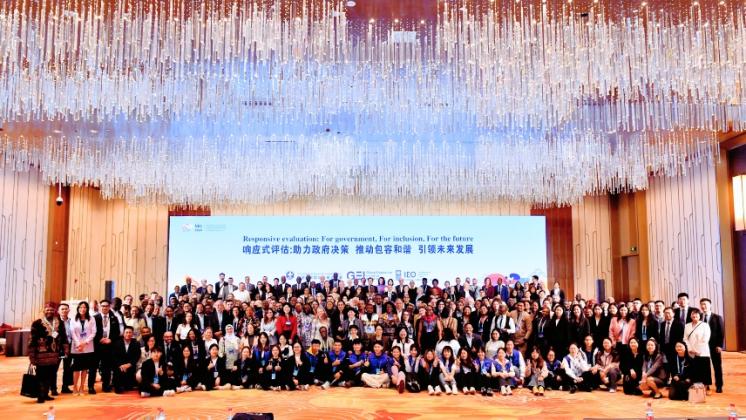2024 National Evaluation Capacities Conference Concludes with 5-Point Beijing Action Plan

More than 500 delegates from over 100 countries attended the 8th National Evaluation Capacities (NEC) Conference held in Yanqing, Beijing from October 14 to 18. The conference brought together experts from governments, the private sector, academia, civil society, and international organizations to share experiences and perspectives around the theme "Responsive Evaluation: For Government, For Inclusion, For the Future." Participants exchanged valuable insights into their national evaluation systems, laying the foundation for a forward-looking vision of evaluation that is inclusive, relevant, and responsive to emerging challenges.
Organized by the UNDP Independent Evaluation Office (IEO), the Global Evaluation Initiative (GEI), and the China International Development Cooperation Agency (CIDCA), the 2024 NEC Conference featured more than 150 speakers and over 20 sessions, which centered around three interconnected strands: National Evaluation Systems, Inclusive Evaluation Systems, and Future-Driven Systems and Approaches.
The NEC sessions covered a wide range of topics including strategies for strengthening national systems through global partnerships; the role of country-led evaluations in achieving the Sustainable Development Goals (SDGs); methods for involving diverse perspectives in evaluation processes; and evaluating environmental sustainability and climate change. Experts also explored how artificial intelligence can complement human decision-making, fueling engaging discussions on efficiency and ethical implications.
One of the most significant outcomes of the NEC Conference was the development of the Beijing Five Actions Towards Responsive Evaluation Systems for 2030. The document, which has yet to be finalized, builds on the insights and experiences shared during the conference, setting forth a roadmap for building more responsive evaluation systems through five action points:
-
Integrate evaluation into public policy development and public sector management at strategic points throughout the program cycle including planning and implementing stages to ensure evaluation knowledge and findings meet information needs in a timely manner.
-
Share best practices and lessons with partners and peers globally, particularly in the Global South, supporting international efforts in public policy evaluation to ensure collaboration and coordination among national evaluation actors.
-
Support a culture of learning by integrating context, engaging and empowering users and decision-makers, disseminating findings, encouraging peer learning across sectors and countries, embedding feedback loops and systematizing the generation, application, and exchange of insights about how to accelerate the achievement of the SDGs.
-
Use new and emerging technologies in the best interests of people.
-
Incorporate climate, the environment, and early-warning approaches and methodologies into evaluation to better capture the connection between resilience and sustainability for the natural world and address risks.
The draft document was presented during the closing ceremony of the 2024 NEC Conference. After gathering feedback and suggestions from NEC participants, the IEO, GEI, and CIDCA will finalize and publish the Beijing Action Plan in the coming weeks.
To view all NEC session recordings and presentation slides, visit the conference resource page.